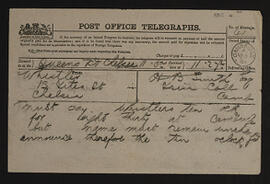12 Pembroke Gardens, Kensington, W. - Has read "Sisyphus" with 'much amusement'; thinks that 'apart from the ingenuity of the plot' Trevelyan has kept it 'all so thoroughly Pagan', though comments on his own 'cheek' for saying so when he knows no Greek and little Latin. Supposes it would 'go very well with a good deal of music', but wonders whether it might be 'rather long' if totally set to music. Asks whether Trevelyan has seen Walter's article in the "Fortnightly [Review]" on the Whistler [biography by Elizabeth and Joseph Pennell]. Sorry that the Women's Liberal [Federation] 'did not employ women stewards at the Albert Hall [for the meeting on 5 December] as there would not have been as much violence; his sister was there for the "Manchester Guardian", and 'very indignant at the violence', but Sickert thinks 'the audience were most to blame in taking things into their own hands'. Asks whether 'the Jingoes' will come into power, since 'as soon as one tries Home Reforms one has the Upper House against everything'.
The Shiffolds, Holmbury St. Mary, Dorking. - Thanks his father for his letter [12/149] and for [William] Everett's, which he returns and which is 'very interesting and characteristic': Everett seems to have 'the sort of mind that might have made a very fine scholar'; supposes as it is he is 'quite a good one, but has not made that his chief business in life'.
Whistler's Gentle Art [of Making Enemies] is 'an odious book. Even in those cases where he is more or less in the right, he alienates one's sympathy'; expects that 'if one indulges in that kind of quarrelsomeness, it grows upon one like a vice'. Calls it 'a curious case' that Whistler should 'so often have behaved like a vulgar cad, and yet have had such great qualities as an artist, and sometimes, I think, as a man too'.
Gives an 1860 quotation in Murray's dictionary for 'requisition', but expects his father has by now decided on the right word. Supposes he will have received a copy of Robert's Sisyphus: An Operatic Fable by now: Aeschylus wrote a 'Satyric Drama' on the subject, but Robert does not expect it was 'much like' his own.
Bessie and Paul are both very well. The weather has been 'very foggy and unpleasant here lately'. The 'prospects of the Education Bill look bad', which is 'a great pity'; is also sorry for [Walter] Runciman and Charles's sake. Fears they [the Liberals] 'will be in a false position with regard to everything till we have fought and beaten the Lords': wishes the Lords 'would reject a Budget', but supposes 'that is hardly possible, even for them'. Sends love to his mother.
Wallington, Cambo, Northumberland. - Sends a letter from [William] Everett who is 'always readable... abnormal in his intense old-fashioned conventionalism'; his 'unwillingness to express satisfaction in anything, and anybody, has a flavour of its own'. Elizabeth has sent them a good account of Paul. Politics 'extraordinarily interesting', with the 'moral and practical element' predominating, and a 'certain obscuration of the party element'. Has got Whistler's "The Gentle Art of Making Enemies" from the London Library; the title is 'revolting' but accurate, since Whistler continually had quarrels when 'a man of sense would have taken things quietly'; his way of writing to and about people is 'singularly offensive'.
Wallington, Cambo, Morpeth. - Asks Robert to look at the catalogue enclosed and share anything he knows about the Meryon and Whistler publications; Campbell Dodgson 'is a high authority'; Robert's friend [Laurence Binyon] might tell him something; cannot write to his 'particular friend' Kenyon about the books of a colleague. 'A Prince Conti of Volaterra' [sic: Piero Gineri Conti?] a 'very imposing and attractive Italian' was brought for a visit by Sir Charles Parson, and much struck by the Trevelyans’ Francia, which he recognised 'with real emotion as an Italian masterpiece'.
Wallington, Cambo, Morpeth. - Thanks Robert for letting him see Julian's book, and for the 'very interesting [Henry?] James article enclosed in it'. Has written to Birmingham for the 'large volume of Meryon' [see 12/342]; doubts he will get the Whistler but would like to hear about it.
![Ticket for Fine Art Society lecture by J. A. M. Whistler, Theatre Royal [Cambridge]](/uploads/r/trinity-college-library/a/2/5/a256f5a5d71c3cbd87d21c51c73666008b2860fc36e4bd6ef8c6a41c3442cf91/SMIH.4.39_thumb.jpg)
